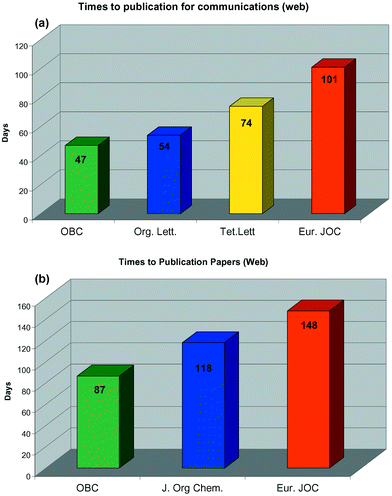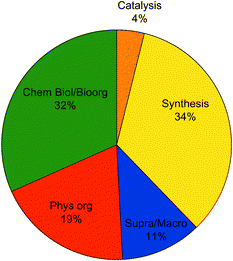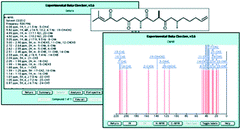Editorial
Fastest publication of organic research
We are proud to report that the publication of research in OBC has been consistently faster than its competitors both for communications and full papers since its inception. This is thanks to fast and thorough peer review, dedicated editorial staff and technical innovation throughout the publication process. It has been these superior publication times, that have made OBC the ideal home for the most exciting work in the field, and set it apart from its competitors. Communications are typically published a whole week faster than its closest competitor Organic Letters, at a speedy 47 days from submission to publication on the web. Full papers are published an impressive four weeks faster than the closest competitor, Journal of Organic Chemistry at just 87 days to publication on the web. These fast publication times go hand in hand with high standards. OBC is committed to publishing work of the highest quality and as a result our rejection rate is over 50%. Our speed of publication is illustrated in Fig. 1, which shows the time in days, from receipt to publication on the web for communications and full papers in OBC and competitor journals. In the January 2004 Editorial1 we reported faster publication times than other journals and are very pleased to report that this speed has continued. | ||
| Fig. 1 Times to publication. Times from receipt to electronic publication are the mean time in days for the period January–July 2004. Data are shown for: (a) Communications – all Communications published in Organic & Biomolecular Chemistry and European Journal of Organic Chemistry (issues 1–15, 2004), Letters published in Organic Letters (issues 1–15, 2004, alternate letters from alternate issues), Short Communications published in Tetrahedron Letters (issues 1–29, 2004, alternate communications from issues 1, 5, 9, 13, 17, 21, 25 and 29). (b) Papers – papers published in Organic & Biomolecular Chemistry and European Journal of Organic Chemistry (alternate papers from issues 1–15, 2004), papers published in Journal of Organic Chemistry (issues 1–15, 2004, alternate papers from alternate issues). | ||
Broad coverage
The remit of OBC continues to be to bring together molecular design, synthesis, structure, function and reactivity in one journal. We believe we have fulfilled this remit and offer a balanced coverage to our readers This is illustrated in Fig. 2. | ||
| Fig. 2 The subject breakdown of articles published in OBC between January and September 2004. | ||
We recently told you about our highlights so far.2 Look out for further top OBC papers in Chemical Science and its new sister publication Chemical Technology. These RSC publications aim to draw together the best papers published in RSC journals on a monthly basis. A number of papers promoted in this way have since gone on to be covered in publications such as Science and Nature. ‘To date I have published two papers inOrganic & Biomolecular Chemistryand the process works great’ says Brad Smith, Professor of Chemistry at the University of Notre Dame, Indiana, USA. ‘The RSC is clearly working hard to promote the papers that appear in its journals.’ OBC readers have the benefit of receiving Chemical Science bound into the print version of the journal helping them to remain up-to-date with developments from all areas of chemical science research. More details about these publications can be found at: www.rsc.org/chemicalscience and www.rsc.org/chemicaltechnology.
OBC continues to publish excellent Emerging Areas and Perspectives. This issue contains the Emerging Area New chiral anion mediated asymmetric chemistry by Jerome Lacour and Richard Frantz and the Perspective Bioorthogonal organic chemistry in living cells: novel strategies for labeling biomolecules by Herman Overkleeft et al. All Emerging Areas published in OBC can be found at www.rsc.org/OBC/EmergingAreas and all Perspectives at www.rsc.org/OBC/Perspectives. We encourage you to take a look.
Looking forward, 2005 brings us many new ventures from the RSC: –
New look
You will have noticed that OBC has a striking new look for 2005. The new modern cover design will enhance the impact of the featured cover artwork and produce a more eye catching journal.New journals
This summer, Organic & Biomolecular Chemistry readers will have free access to the online versions of the RSC's two new multidisciplinary journals. Molecular BioSystems will be a high impact monthly chemical biology journal, with a particular focus at the interface between chemistry and the -omic sciences and systems biology. A key feature will be ‘Methods’ – short primary research articles reporting new methodology. www.molecularbiosystems.org has further details. The second journal, Soft Matter, will be a high quality journal publishing research into soft materials, including complex fluids, with a particular focus on the interface between chemistry and physics. It will provide a forum for the communication of the generic science underpinning the properties and applications of soft matter. www.softmatter.org has further details.New books
The first books in the new RSC Biomolecular Science Series will be published in 2005. This series has Professor Stephen Neidle as its Editor-in-Chief and will provide an authoritative insight to research at the interface between chemistry and biology.Supporting our authors and referees
The RSC has developed a number of tools to help our authors and referees through the publication process.ReSourCe provides authors and referees with a single web account for their publishing activities.3 Referees can use ReSourCe to download files for manuscripts they have been asked to review and link directly to the correct report form to write their report. In addition, they can access information about the outcome of articles they have reviewed previously. ReSourCe provides a homepage where referees can view and update their contact details and research profile. Authors can use ReSourCe to view and access all the information and tools they need to submit their manuscripts online. ReSourCe provides manuscript tracking and proofing facilities. Authors are also able to access a list of their previous manuscripts and for published articles collect their free PDF reprints and link to the online articles (www.rsc.org/resource).
A recent collaboration with the Unilever Centre for Molecular Science Informatics (at the University of Cambridge, UK) has resulted in the Experimental Data Checker – a java applet which analyses experimental data. Its aim is to provide helpful information which an author can use to improve a paper, a referee can use to check a paper and a reader can use to analyse a paper. A study of this was published in OBC last year.4 We encourage all authors to try this service which is available at www.rsc.org/is/journals/checker/run.htm.
Finally, we would like to express our thanks and gratitude to everyone who has supported OBC by contributing excellent papers and providing valuable and speedy referees' reports. The reputation of the journal and, ultimately its success or failure, is dependent on the work submitted by supportive authors and the reports provided by dedicated referees.
As always, Editorial Board members and staff welcome suggestions as to how the journal might be improved or enhanced further. We wish you all every success in 2005.
Professor Ben Feringa, Chair Editorial Board
Dr Caroline Potter, Managing Editor
References
- B. Feringa and C. Potter, Org. Biomol. Chem., 2004, 2, E1 RSC.
- C. V. Potter, J. L. Dean, A. P. Kybett, R. Kidd, M. James and M. Canning, Org. Biomol. Chem., 2004, 2, 3535 RSC.
- C. Bostock-Smith, Org. Biomol. Chem., 2004, 2, E3 RSC.
- S. E. Adams, J. M. Goodman, R. J. Kidd, A. D. McNaught, P. Murray-Rust, F. R. Norton, J. A. Townsend and C. A. Waudby, Org. Biomol. Chem., 2004, 2, 3067 RSC.
| This journal is © The Royal Society of Chemistry 2005 |

